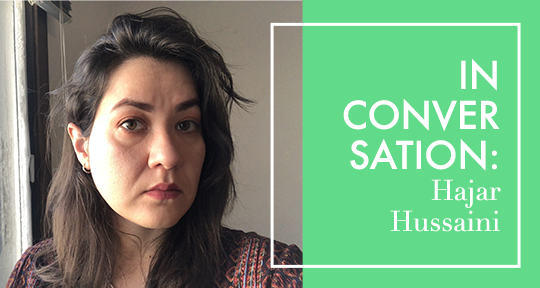Poet and translator Hajar Hussaini has made her mark powerfully with the debut collection, Disbound, which navigates the distance between her two countries—Afghanistan and the United States—with musical precision and great sensitivity to linguistic friction and spark. Additionally, in her work to bring the texts from her native Persian into English, she is continuing a vital poetic lineage of political urgency, independent voice, and pathways towards empathy—powerfully exemplified in her translation of S. Asef Hossaini’s poems in our Spring 2023 issue. In this following interview, Hussaini discusses her personal statement of a “poetics of abandonment”, the communication channel between nations, and writing from “within” as opposed to “about”.
Terezia Klasova (TK): In an essay you wrote for The Poetry Foundation, you suggest an approach to writing called a “poetics of abandonment.” Is it characteristic only of your writing of poetry, or do you consider it descriptive of most, if not all, of your writing? Do you think it can be applied to other types of writing or other authors, and if yes, how so?
Hajar Hussaini (HH): I intended the “poetics of abandonment” to be a statement on my poetry collection, Disbound, and I’ve described it as the culmination of political and personal losses that manifest in a radical offering of language, sincerity, and understanding—in the hope of creating a (perhaps false) sense of equilibrium between the poet and her reader. I used the Persian concept of Taroof as the central metaphor of this poetics; I understand Taroof, in its essence, as a refusal to become the subject of pity, and through writing about it I came to see it as the only way out of certain intrinsically hierarchical relationships.
As I explained in the essay, writing abandonment is contingent upon the circumstances in which a poet writes. Of course, Afghan poets of my generation share this context, and some may conceive of composing poetry similarly (e.g. in giving one’s all to the poem). But I don’t know if categorizing their works under “poetics of abandonment” is helpful because the poets I translate have a readership in Persian, whereas I write in English. Their readers come from similar sociocultural backgrounds and are familiar with that loss because they share a collective memory, whereas that memory does not have an equivalent currency for my readers because the average English reader of American poetry who would gravitate toward my work is presumably less familiar with my literary and political references. In this way, I have lost something that an Afghan poet writing in Persian has not, but I have also gained readers that they will only have in English if a translator mediates.
It’s important to mention something about being an Afghan who has lived in between Afghanistan and Iran. I write poetry in English, and Persian is my mother tongue; I know both languages very intimately. Like Hossaini and myself, many Afghans have lived in Iran—and those who have not, have read Iranian books, watched Iranian films, and listened to BBC Persian. So, contemporary Afghan literature in Persian is a blend of Kabuli and Iranian Persian.
I think of the poetic statement genre as simultaneously personal and public. The statement traces the conceits of one poet while inviting other poets to similarly conceive. Regarding the influence of writing “abandonment” over my translations, I think it has so far played a role of gravitating me toward sincere and honest texts. READ MORE…

